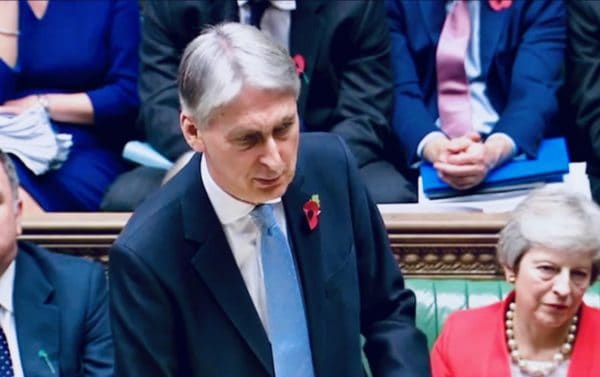As one would expect, yesterday’s Autumn Budget announcement delivered something for everyone. With Brexit getting closer, the UK Government is in “all-hands” mode seeking to boost the economy in preparation for the European divorce. Chancellor of the Exchequer Philip Hammond stated:
“We are at a pivotal moment in our EU negotiations … and the stakes could not be higher: Get it right, and we will not only protect Britain’s jobs, businesses and prosperity… but we will also harvest a double “Deal Dividend””
Beyond plenty of tax changes, including a digital tax on big tech, and stimulus spending designed to juice economic activity, what was buried in the budget that can improve the UK Fintech ecosystem?
It was more of a shot-gun approach by the Treasury. The budget has added a bit more fuel to finance innovative new firms:
“To build on the UK’s position as a world Budget 2018 3 leader in innovation and new technologies, the Budget also announces £1.6 billion in science and innovation including investment in Artificial Intelligence (AI), quantum computing, future manufacturing, and nuclear fusion. The government is backing business and entrepreneurship by increasing access to finance for private sector investment and helping people who want to start and grow businesses. This includes action to unlock pension fund investment in growing firms and policies to raise business productivity. The Budget is also boosting exports by extending UK Export Finance’s direct lending scheme by £2 billion in 2020-21 and 2021-22.”
 Spotcap managing director, Niels Turfboer, described the additional funding as a continuation of existing policy:
Spotcap managing director, Niels Turfboer, described the additional funding as a continuation of existing policy:
“It was not surprising to see support of the tech and innovation sectors in the Budget. £1.6 billion pounds to fund advances in technology, is a natural continuation of the 2017 Autumn Budget pledge of a £20 billion investment for financial innovation over the next 10 years. The focus on supporting these industries are very much in line with comments made by Hammond while at the annual IMF meeting earlier this month. There he stated that the UK would be a “natural global home” for new and innovative financial services. And with Brexit around the corner these signals will play a role in shaping perceptions of the future of the UK’s financial technology and Fintech sectors.”
Charlotte Crosswell, CEO of Innovate Finance, said there were three takeaways from Hammond’s Budget to support a thriving Fintech ecosystem. Crosswell said that an innovative, responsible application of technology has the potential to drive better, faster financial services for individuals and small business. It also has the potential to be a leading UK export and a key contributor to jobs and growth in the years to come.
“We welcome the government’s ongoing commitment to furthering UK innovation. We can see this today in the focus on artificial intelligence [AI], with further funding and fellowships, to ensure the UK is at the forefront not just of AI development, but of important considerations around its application.”
 According to the UK Government, the Office for AI and Government Digital Service (GDS) will review how government can use AI, automation and data in new ways to drive public sector productivity and wider economic benefits. This will feed into the innovation strategy being led by the Cabinet Office.
According to the UK Government, the Office for AI and Government Digital Service (GDS) will review how government can use AI, automation and data in new ways to drive public sector productivity and wider economic benefits. This will feed into the innovation strategy being led by the Cabinet Office.
“Specifically on Fintech, we are pleased to see another round of the Fintech Challenge launched with £2 million allocated to the Affordable Credit Challenge Fund, promoting innovative technological solutions to support social and community lenders,” added Crosswell. “This follows the success of the Rent Recognition Challenge earlier this year, incentivising firms to put fast solutions to market to increase rates of financial inclusion. We are delighted the government continues to recognise that Fintech companies have a significant role to play.”
Crosswell also welcomed the conclusion of the Cryptoassets Taskforce Report. A comprehensive regulatory framework will be forthcoming in the coming months. Importantly, the triumvirate of agencies that worked on the Taskforce – embraced blockchain / DLT innovation while seeking a path to regulate cryptoassets in a transparent and consumer friendly manner.
Patient Capital received an update since the year prior publication. HM Treasury published a “one year on” report affirming that the government is committed to supporting the UK’s fast growing and innovative firms to secure the external finance they need as the UK leaves the EU. The report touched upon the important EIS and VCT tax schemes.
“Patient capital is a key stream of funding for Fintech given the nature of the sector’s growth and continued scalability. It’s encouraging to see progress unveiled today increasing available sources of pooled patient capital from pension investments and plans to update the regulatory framework allowing this to take place,” Crosswell stated. ” It is also positive to see first steps in forward planning for funding sources post-Brexit, particularly given we are already seeing a sharp drop in European Investment Fund monies into the UK. It is right that this has been identified as a gap which must be tackled in order to retain the sector’s ambitious growth rates.”
Crosswell was “encouraged” by the Digital Tax which was announced yesterday. This new Digital Services Tax will be paid only by profitable companies that generate more than £500 million in global revenues each year. Commencing in April 2020, the new tax targeting big tech is expected to generate over £400 million in tax revenue a year.
“… it is only right that these global giants, with profitable businesses in the UK, pay their fair share towards supporting our public services,” the Chancellor stated.
Crosswell described the tax as creating an ecosystem that supports smaller firms.
“We are encouraged that the Digital Tax announced today will target larger companies, already successful at scale, allowing start-ups to continue to enjoy the impressive growth they have seen so far and to provide increased competition through disruption of more traditional sectors. Finally whilst there is welcome prudence in increasing funds available to government departments to prepare for the event of no deal being reached with our European Partners, it is important to reiterate that it is the smaller companies who struggle the most with the uncertainty around future operating arrangements. To create the best possible environment for success, urgent clarity is needed so we can provide practical help and advice to the UK’s Fintech ecosystem.”
Tandem CEO, Ricky Knox, said this budget did a lot right. The digital bank executive said they are seeing changes that put money in the hands of the people who need it – “that’s what really matters.”
 Knox believes that raising the income tax personal allowance, while boosting the national living wage is a good thing.
Knox believes that raising the income tax personal allowance, while boosting the national living wage is a good thing.
“We’re looking at people earning the living wage taking home around £700 a year more and saving over £100 of tax on their basic income, as of April. This is back to basics stuff and a real windfall for ordinary people. Too many people in the UK are struggling and it’s reassuring to see the Autumn Budget addressing this head on.”
Knox added a note of caution though as there remain many unknowns in the Brussels negotiations.
“Where the Chancellor might be too optimistic is in his short term outlook. It’s important to remember that this is the last budget beforeBrexit – there could be a sting in its tail in the form of revisions.”


